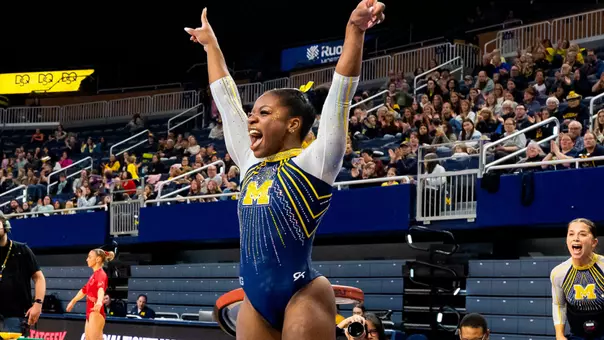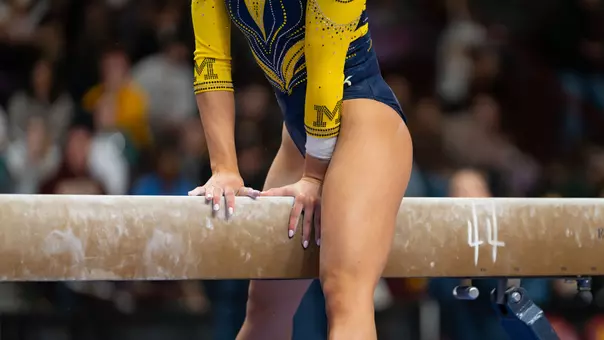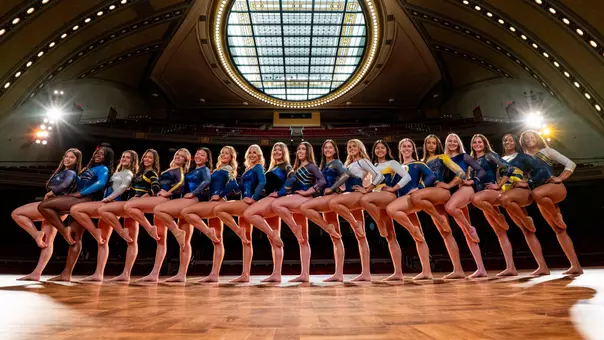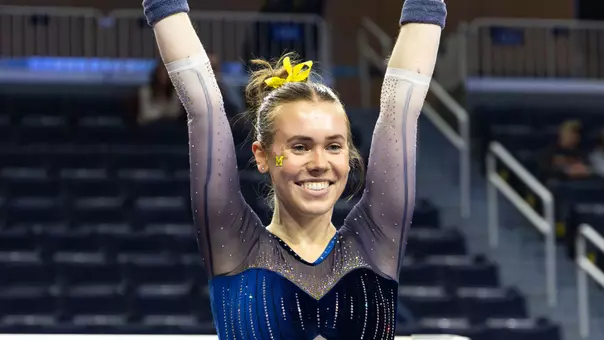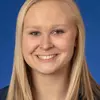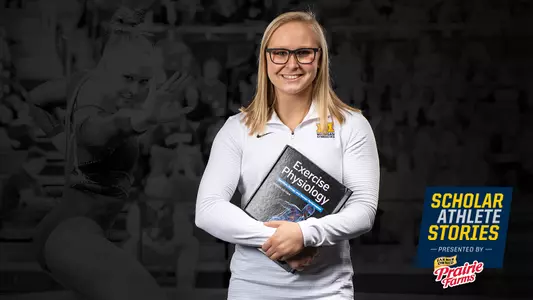
Scholar Stories: Gymnast O'Hara Wants to Help Kids with Disabilities
2/6/2019 8:00:00 AM | Women's Gymnastics, Features
Continuing the popular series that began in 2016-17, each Wednesday MGoBlue.com will highlight a Michigan student-athlete and their academic pursuits. These are our Scholar-Athlete Stories, presented by Prairie Farms.
By Ben Blevins
Maggie O'Hara saw firsthand the impact a physical therapist can have with children who have mental or physical disabilities, and she wants to make a career out of changing lives for the better.
When Maggie was six years old, her younger sister, Gracie, was born. Maggie loved her little sister more than anything.
Gracie was born with several health issues, including plagiocephaly (flat head syndrome), Marcus Gunn Jaw-Winking Syndrome (rare eye disorder with loss of vision) and an immune deficiency. The health issues required her to wear a helmet on her head for two years and spend around 50 days in the hospital during the first year of her life. She also needed eight surgeries by the time she turned two and made weekly visits to the cancer center to try and boost her immunities.
Due to her health issues, Gracie was delayed in all aspects of her development and needed to go to sensory integration occupational and physical therapy. Maggie's mother, Michelle, would often take Maggie and her two brothers with her to Gracie's therapy sessions. Maggie developed an early interest in the medical field and made it a priority to help other children with disabilities.

O'Hara (middle) regularly visits C.S. Mott Children's Hospital as part of the Michigan "From the Heart" program.
"Maggie was a big help, even at six years old," said Michelle. "She worshiped the ground the little one walked on. She was willing to help with anything. She was always interested in what was going on with Gracie and how to fix it. She was an inquisitive kid."
The family eventually had a therapist come to their home to work with Gracie. Seeing the patience of the therapist and improvement in her sister fueled Maggie's desire to pursue a career as a physical therapist who works with children who have developmental disabilities.
"For years I thought that was the coolest job ever," said Maggie. "It is a really rewarding field because a lot of those kids feel left out or people look down on them. I know for my sister, a big thing was having those people who cared about her and looked at her like a normal kid, instead of a kid with a droopy eye or misshaped head. I want to go into that field to help kids prove to others that they are just as capable as anyone else of doing things they want to do."
In middle school and high school, Maggie volunteered to work with a special needs class instead of her study hall hours. In high school, she also did a program called Teacher Cadet that allowed her to work in a third-grade classroom that had two kids with physical and cognitive delays. Maggie graduated high school a year early in order to come to Michigan and knew that movement science was the major she wanted.
After arriving in Ann Arbor, Maggie started making weekly visits to C.S. Mott Children's Hospital as part of the Michigan "From the Heart" program. Visiting those children has become one of the highlights of her week.
Last semester, Maggie took a class called MOVESCI Physical Activity and Pediatric Disabilities. Every Friday she visited Haisley Elementary School to work with kids who have autism.
"That was one of the coolest things I have ever done," said Maggie. "We taught them everyday life skills that the parents sometimes have a hard time teaching. Those kids with disabilities will often times shut down because they think they can only do things one way. It is fun to teach them. For example, they mostly throw underhand, but we'd work with them to throw overhand."
The class was perfect for Maggie as it also included lectures bi-weekly. She could take what she learned and apply it in the classroom with the kids.
"You can sense the frustration on their face that we all have when we can't figure something out," said Maggie. "When they smile or clap after accomplishing something, that is the most rewarding thing ever for me. When they reach their milestones, it's awesome."
When Maggie goes back home, she likes to spend time with her mother, who works in the surgery department at Prisma Health Baptist Hospital in Columbia, South Carolina. Any chance she gets Maggie likes to soak up knowledge about the health field.
She has even used her coursework to help her understand how her own body works.
"Last year I did a project in my anatomy class where I took one of my gymnastics pictures and dissected all the muscles that were being used in my leg," said Maggie. "I talked about which ones were concentric and these were eccentric and some were isometric and how those all played a role in making my body do what it was doing in the picture."
Unfortunately, Maggie was recently sidelined for the remainder of the 2019 season after suffering an injury during floor exercise warmups at Maryland. It was a disappointing end to the year for someone who had come so far.
Over the course of her first two years at Michigan, Maggie only competed one balance beam routine. She trained hard over the summer with head strength and conditioning coach Lew Porchiazzo and focused on her nutrition with performance dietitian Tiffany Ilten. She entered her junior year in the best position to make a lineup since she came to Ann Arbor and worked her way into both the beam and uneven bars lineups for the season opener in Cancun, Mexico.

"It was a lot of fun," she said. "I actually didn't know I was going to be in the beam lineup until warmups, so that was crazy. The extra work over the summer really paid off coming into this season. This group of girls is incredibly strong, and I don't think I could have done it without them. It was great to finally be able to contribute and help the team."
Maggie hit all six of her routines in the first three meets of the season, posting a high of 9.825 on both bars and beam in Cancun. She was added to the floor exercise lineup for the meet at Maryland and was excited to show off her Star Wars-themed routine. While doing one of her floor passes during warmups, she punched the floor knew immediately something was wrong.
"I clutched the back of my leg and knew that it was bad," said Maggie. "When the doctor came in and did the Thompson test to test for the rupture of the Achilles tendon and I didn't respond, I kind of lost it. Then the coaches came in and I realized this was the time to be strong for my team instead of dwelling on it. I am really looking forward to bringing positivity into the gym, as hard as this is going to be, and next year I will have an industrial-grade Achilles."
Much like the pediatric therapists who worked with her sister, Maggie has a great example to follow in coming back from her injury as senior Olivia Karas suffered the same injury last February. Karas approached her recovery with a positive attitude and provided support for her teammates throughout the remainder of the season. She is now back performing at a high level her senior year.
O'Hara knew the impact of Karas' positive attitude on the team and plans to provide the same uplifting support.
"Liv was pretty inspiring through it all," said O'Hara. "I know originally it was really hard to stomach for her because gymnastics was all she had ever known. She stepped up and brought light to every single meet and all the practices. I think watching her do all that last year and come back this season has brought a lot of hope for me."
After Maggie graduates from Michigan, she plans to go to physical therapy school and get her doctorate, all inspired by her sister Gracie. The two of them talk almost every day. Gracie is doing very well now and has even followed in her sister's footsteps and is competing in gymnastics.

